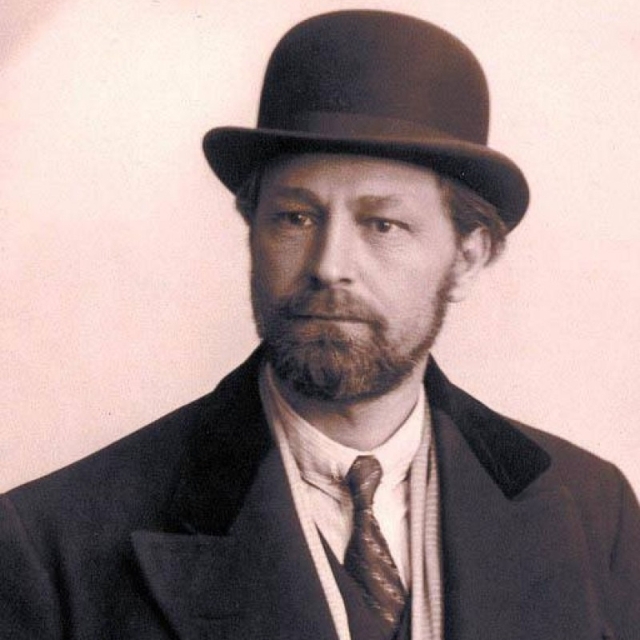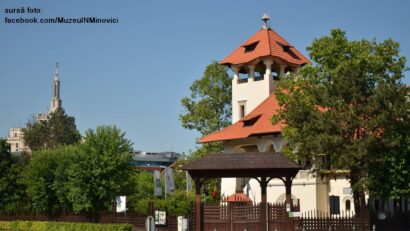Writer Vasile Voiculescu
Vasile Voiculescu gained literary recognition due to his religious poetry and fantasy fiction.

Christine Leșcu, 06.05.2017, 13:59
Born in November 1884 in Buzau County, writer Vasile Voiculescu, who passed away in April 1963, gained literary recognition due to his religious poetry and fantasy fiction. He was also one of the iconic figures of the anti-communist resistance, being imprisoned for his religious beliefs. A keen literature lover but also a professional medical doctor, Vasile Voiculescu never fully gave up all of his passions. While he made his literary debut in 1916 with the volume “Poetry”, Vasile Voiculescu continued to practice military medicine over 1917-1918 during the Great War. Once peace was restored, he continued to practice medicine, first as a district physician in Bucharest, then within the Crown Property Agency in 1920. All this time he continued to publish poetry as well as theatre plays, making a name for himself amidst the city’s literary circles. Seen by many a religious and traditionalist poet, Voiculescu stunned his contemporary peers by switching to fantasy fiction of folk influence, which was rather a disregarded literary current in Romania at the time.
Here is historian and literary critic Florentin Popescu talking about this preference: “His prose was a surprise to many people. Writers would gather at Barbu Slatineanu’s place, who was a collector of ceramics and discs. His house was located in the Uranus-Izvor neighborhood, which was later demolished. Many writers did readings there, including Voiculescu, who read his fantastic stories. Many critics were very enthusiastic about his work, although Voiculescu did not realize at first how valuable it really was. He thought it had just been a game turned into stories.”
The literary value of those fantastic stories were not just a game and, as a result of their appreciation, as of 1930 he started doing the weekly show “Village Time” (Ora satului) on Radio Romania. Then, in 1933 he became a literary advisor at the Romanian Radio Broadcasting Corporation and then director of the literary programme, a position that he held until 1945.
Here is Florentin Popescu again recalling moments from Vasile Voiculescu’s radio activity: “He played a very important role at the Radio. He wrote a feature giving medical advice to people in the countryside; those features were included in a book titled “All Remedies at Hand” published in 1935, actually the first book of homeopathy in Romania. He was happy to support young people. At a certain point, young lady poet Magda Isanos joined him in the studio. She was greatly appreciated later on, but unfortunately, she died very young and Voiculescu deplored her death. Although sometimes he was bored and annoyed by phone calls and ambitious people, he had the ability and diplomacy to accept and air only valuable things.”
After 1944, Vasile Voiculescu took part in the meetings of a literature circle called “Rugul Aprins” (Burning Pyre). The group was made up of intellectuals and culture figures of strong Christian Orthodox faith, and would convene at the Antim Monastery in Bucharest. Unfortunately, the communist authorities dismantled it and imprisoned its members.
Vasile Voiculescu was also sent to prison, and his works were banned. Here is Florentin Popescu with more details: “His writings were analysed especially after his death and his rehabilitation, because as everybody knows he was unjustly incarcerated for 4 years. He was 73 when he was imprisoned, and when he got out his body was ravaged. There are some shattering testimonies made by his children, with regard to his state when he came out of prison. It was the year 1958, a bleak period in history, when intellectuals, scientists, officers were thrown behind bars indiscriminately. One of the reasons he was imprisoned had to do with his religious beliefs, but the indictment also made reference to a number of poems in which the communist activists of the time insisted they had identified political undertones indicating that the poet was criticizing the Soviet Union.”
Released from prison in 1962, Vasile Voiculescu only survived for another year. His well-known poetry volume “The last sonnets of Shakespeare in Imaginary Translation by V. Voiculescu” as well as the phantasy novel “Zahei the Blind” were published posthumously.






























